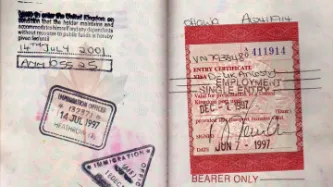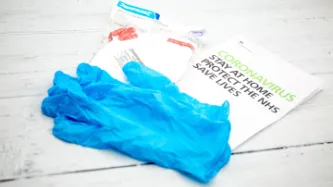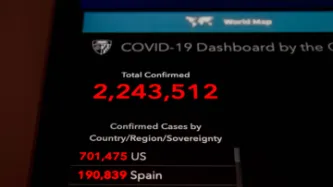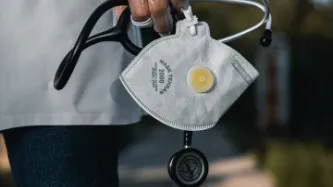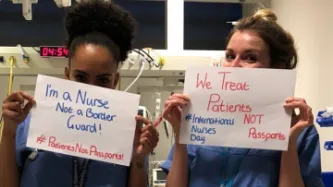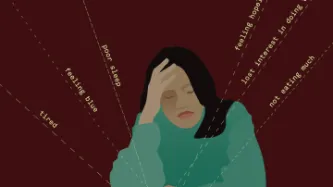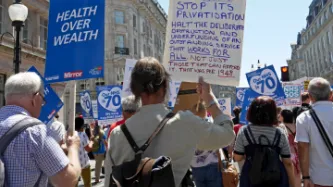Search
Content type: News & Analysis
In September 2019, PI published the report Your Mental Health for Sale. Our investigation looked into popular mental health websites and their data sharing practices.
Our findings suggest that, at the time of the research, most websites we looked at were using third party tracking for advertising purposes, sometimes relying on programmatic advertising technologies such as Real Time Bidding (RTB), sharing personal data with potentially thousands of actors. Some websites were also found sharing…
Content type: Long Read
What Do We Know?
Palantir & the NHS
What You Don’t Know About Palantir in the UK
Steps We’re Taking
The Way Forward
This article was written by No Tech For Tyrants - an organisation that works on severing links between higher education, violent tech & hostile immigration environments.
Content type: Examples
The UK's Project OASIS collects data from third-party app providers that are collecting COVID-19 symptoms and demographic data to help the NHS respond to the COVID-19 pandemic. The Ministry of Defence Strategic Command's technology innovation hub, JHub, has been brought in to provide assistance and coordination, and to facilitate the secure transfer of relevant symptom and epidemiology data from the third-party apps to NHSx. Part of JHub's role is to remove any identifying information, erase…
Content type: Examples
The UK's NHSx contact tracing initiative requires anyone who tests positive for COVID-19 to provide the full name, postcode/house number, phone number, and email of anyone they've been in contact with, and Public Health England will keep the data for 20 years. The privacy notice was quickly updated to not that those testing positive will also be asked for NHS number, sex, symptoms, and when symptoms started. Those gaining access to the data will include two outsourcing companies, Serco and…
Content type: Examples
NHS Digital has added facial recognition to its app, which allows people to order prescriptions, book appointments, and find health care data, in hopes it will also be usable as an "immunity passport" once at-home testing becomes available. The NHS facial recognition system was built by iProov, and is available in England for both Android and iOS devices; users enroll by submitting a photo of themselves from an official document such as a passport or driving licence and then using the phone to…
Content type: Advocacy
Last week, Privacy International joined more than 30 UK charities in a letter addressed to the British Prime Minister Boris Johnson, following his recent declaration, asking him to lift No Recourse to Public Funds (NRPF) restrictions.
Since 2012, a ‘NRPF condition’ has been imposed on all migrants granted the legal right to live and work in the UK. They are required to pay taxes, but they are not permitted to access the public safety net funded by those taxes.
This is not a topic we are known…
Content type: News & Analysis
As countries around the world develop contact tracing apps to contain the spread of Coronavirus, they keep facing a problem: for them to be effective a certain percentage of the population has to download them. Something like 60% is the threshold for the app to be effective. So far only Iceland has gotten close with 38% of their country downloading it.
The UK is currently trialling an app, which is designed to notify people if they've been close to someone with symptoms of covid-19 for 15…
Content type: News & Analysis
This week, we read that a former Apple contractor who blew the whistle on the company’s programme to listen to users’ Siri recordings has decided to go public, in protest at the lack of action taken as a result of the July 2019 disclosures. The news adds to a series of revelations that have been reported over the past months.
While the issue raises serious questions regarding the compatibility of such practices with data protection laws, at the same time, it highlights a wider problem that…
Content type: Examples
At a cost to itself of £88,000 a week in salaries alone, Palantir has committed 45 engineers to a government data project intended to help predict surges in demand for the NHS during the pandemic. The company will be paid £1 a week for its work. Besides Palantir's work supporting the US Immigration Customs and Enforcement, a major concern is vendor lock-in that may make it difficult for NHSx to extract the insights Palantir helps it develop and move elsewhere.
https://tech.newstatesman.com/…
Content type: Examples
More than 3 million people in the UK have downloaded the JoinZoe COVID Symptom Tracker, which was designed by doctors and scientists at King's College London, Guys and St Thomas' Hospitals working in partnership with the health science company ZOE Global Ltd and endorsed by governments and NHS in Scotland and Wales, and supported by numerous UK health charities. The app asks for some basic information, including an email address, after which it asks you to check in once a day to say whether you…
Content type: Long Read
This week saw the release of a coronavirus tracking app within the United Kingdom, initially to be trialled in the Isle of Wight. Privacy International has been following this closely, along with other ‘track and trace’ apps like those seen in over 30 other countries.
The UK’s app is no different. It is a small part of a public health response to this pandemic. As with all the other apps, it is vital that it be integrated with a comprehensive healthcare response, prioritise people, and…
Content type: Long Read
On 12 April 2020, citing confidential documents, the Guardian reported Palantir would be involved in a Covid-19 data project which "includes large volumes of data pertaining to individuals, including protected health information, Covid-19 test results, the contents of people’s calls to the NHS health advice line 111 and clinical information about those in intensive care".
It cited a Whitehall source "alarmed at the “unprecedented” amounts of confidential health information being swept up in the…
Content type: Long Read
Today, migrant communities in the UK already face multiple well-documented obstacles in accessing healthcare, not least because of charges to access the National Health Service (NHS), as it is the case for non-EU migrants, and legitimate fears of data-sharing between the NHS and the Home Office.
In the current pandemic, in addition to these concerns, asylum-seekers face an impossible choice: risk exposure to coronavirus, or be unable to apply for asylum.
Individuals seeking…
Content type: Press release
Photo by Ashkan Forouzani on Unsplash
Today Privacy International, Big Brother Watch, medConfidential, Foxglove, and Open Rights Group have sent Palantir 10 questions about their work with the UK’s National Health Service (NHS) during the Covid-19 public health crisis and have requested for the contract to be disclosed.
On its website Palantir says that the company has a “culture of open and critical discussion around the implications of [their] technology” but the company have so far…
Content type: Examples
NHS England is using Yoti's digital ID card solution to verify health care workers' identity; the cards are added to staff phones, enbaling them to use a contactless ID app to prove their identity both online and offline. Yoti is providing the system for free for three months to all public health organisations, emergency services, and community initiatives working to contain the pandemic.
Source: https://www.biometricupdate.com/202004/uk-national-health-service-rolls-out-yotis-biometric-…
Content type: Examples
British biometric start-ups are helping the UK government create digital passports.
VST Enterprises is providing a biometrics-backed digital health care passport, V-COVID, to help critical NHS and emergency services workers get back to work; the passport will incorporate test results and be included in an app that can be scanned from two meters away. In combination, Patchwork Health, which provides NHS trusts with a digital platform and Truu, which provides a digital staff passport,…
Content type: Examples
On March 20, the UK's Department of Health and Social Care published a notice providing legal backing for the NHS to set aside the duty of patient confidentiality as part of its response to the COVID-19 pandemic. As long as it is to fight the coronavirus, NHS organisations and GPs may share whatever patient data they deem necessary.
Source: https://twitter.com/halhod/status/1245297265054367744/photo/1
Writer: Hal Hodson
Publication: Twitter
Content type: Examples
The UK's National Health Service is collaborating with Palantir to launch a data platform that will track the movement of critical staff and materials; it will, for the first time, give ministers a dashboard showing the first-ever comprehensive view of the entire health care system. The data Palantir gathers into a data store from across the health sector will not include individual patient data; instead, it will include A&E capacity, calls to the NHS 111 hotline, and the number and…
Content type: Advocacy
The letter has been signed by more than 40 organisations and it is open for individuals to sign.
At the moment, the Department of Health and Social Care has given no assurance that NHS data will not be shared with the Home Office and used for immigration enforcement, including for those people with a confirmed coronavirus diagnosis.
Assurances which were confirmed by the Irish government as part of their response to COVID-19: last week, during a Parliamentary debate, Irish Minister of Health…
Content type: Examples
The coronavirus action plan announced on March 3, alongside many measures for managing the NHS in the crisis, will also allow the Investigatory Powers Commissioner to appoint judicial commissioners (JCs) on a temporary basis in the event that there are insufficient JCs available to operate the system under the Investigatory Powers Act 2016. The Home Secretary, at the request of the Investigatory Powers Commissioner, will also be allowed to vary the time allowed for urgent warrants to be…
Content type: Examples
A new surveillance system to detect cases of COVID-19 in England was established by Public Health England (PHE) and the NHS to strengthen existing systems and to prepare for and prevent wider transmission of the virus. Some NHS hospitals have been asked to take part in the plan, which involves testing samples from patients with severe respiratory infections who do not meet the current definition for COVID-19 in intensive care units (ICU) and Severe Respiratory Failure (ECMO) Centres. …
Content type: Report
The changes discussed in this article are based on a second analysis performed in late November, 3 months after the original study Your Mental Health is for Sale and following the exact same methodology. All data collected can be found at the bottom of this page.
Change is possible
Back in September 2019 we published the report Your Mental Health is for Sale exposing how a majority of the top websites related to mental health in France, Germany and the UK share data for advertising purposes.…
Content type: Long Read
Following a series of FOI requests from Privacy International and other organisations, the Department of Health and Social Care has now released its contract with Amazon, regarding the use of NHS content by Alexa, Amazon’s virtual assistant. The content of the contract is to a big extent redacted, and we contest the Department of Health’s take on the notion of public interest.
Remember when in July this year the UK government announced a partnership with Amazon so that people would now…
Content type: Long Read
This research is the result of a collaboration between Grace Tillyard, a doctoral researcher in the Media, Communications and Cultural Studies department at Goldsmiths College, London, and Privacy International.
Social Protection Systems in the Digital Age
In the digital age, governments across the world are building technologically integrated programmes to allow citizens to access welfare payments. While smart and digital technologies hold the potential to streamline administrative…
Content type: Long Read
A new study by Privacy International reveals how popular websites about depression in France, Germany and the UK share user data with advertisers, data brokers and large tech companies, while some depression test websites leak answers and test results with third parties. The findings raise serious concerns about compliance with European data protection and privacy laws.
This article is part of a research led by Privacy International on mental health websites and tracking. Read our…
Content type: News & Analysis
This article is part of a research led by Privacy International on mental health websites and tracking. Read our full report.
According to the World Health Organisation (WHO), 25 percent of the European population suffers from depression or anxiety each year, yet about 50% of major depressions remain untreated. This means that everyday thousands of people are looking for information about depression online. They take tests to find out how serious their symptoms are, they try to access…
Content type: Examples
In November 2018 the UK's Equality and Human Rights Commission warned that asylum seekers have been deterred from seeking medical help in Scotland and Wales since the UK government began forcing the English NHS to charge upfront in 2017 and by fears that medical personnel will comply with Home Office orders to forward their data. The commission, along with health charities and the Labour and LibDem political parties, called for the policy to be suspended. The Home Office policy of moving asylum…
Content type: News & Analysis
Today, the British Health Secretary Matt Hancock announced a partnership between the NHS and Amazon to use the NHS’s website content as the source for the answer given to medical question, such as “Alexa, how do I treat a migraine?”
While we welcome Amazon’s use of a trusted source of information for medical queries, we are however extremely concerned about the nature and the implications of this partnership. Amazon is a company with a worrying track record when it comes to the way they…
Content type: Examples
The rise of social media has also been a game changer in the tracking of benefits claimants. In the UK in 2019, a woman was jailed after she was jailed for five months after pictures of her partying in Ibiza emerged on social media. She had previously sued the NHS for £2.5 million, after surviving a botched operation. She had argued the operation had left her disabled and the “shadow of a former self” but judges argued that the pictures suggested otherwise.
https://www.dailymail.co.uk/news/…


